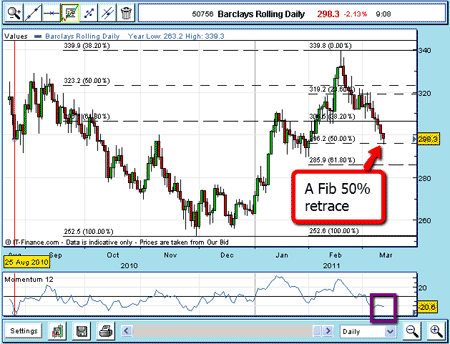Barclays: not cheerful, but cheap
Of all the big banks, it's probably fair to say Barclays has had its fair share of bad publicity, says Matthew Partridge.

Get the latest financial news, insights and expert analysis from our award-winning MoneyWeek team, to help you understand what really matters when it comes to your finances.
You are now subscribed
Your newsletter sign-up was successful
Want to add more newsletters?

Banking is not a popular sector. But of all the banks in Britain right now, it's probably safe to say that Barclays has had more than its fair share of bad publicity this year. Six weeks ago the Serious Fraud Office surprised many when it decided to press criminal charges against four former executives, including ex-CEO John Varley, over actions related to their decision to seek funding from Qatar during the height of the financial crisis. Experts warn that the trial could drag on for years.
But it's not just former executives who are under the spotlight. Current CEO Jes Staley is under investigation for his attempts to unmask a whistleblower last year, something that he admits was wrong. The Financial Conduct Authority and Prudential Regulation Authority are still investigating what happened and a report on his behaviour is due out in the autumn. Experts believe that if the report is particularly critical, Staley could yet resign, throwing the bank into turmoil.
If the public side of Barclays has been under pressure, at first glance the business side doesn't seem to be doing much better. Indeed, recent earnings figures have been disappointing. Compensation payments from the mis-selling of payment protection insurance, and costs associated with the disposal of assets in Africa, saw the bank post a heavy loss this quarter. Investors in the stock have also had a turbulent time even a recent rally has failed to lift them back to where they were two years ago, let alone restore them to the post-financial-crisis highs.
Try 6 free issues of MoneyWeek today
Get unparalleled financial insight, analysis and expert opinion you can profit from.

Sign up to Money Morning
Don't miss the latest investment and personal finances news, market analysis, plus money-saving tips with our free twice-daily newsletter
Don't miss the latest investment and personal finances news, market analysis, plus money-saving tips with our free twice-daily newsletter
Yet appearances can be deceptive. The sale of African assets should result in a more streamlined business and boost the balance sheet, increasing the tier 1 capital ratio (which increases the bank's ability to weather a downturn in the credit markets). That the process is being completed six months earlier than planned reflects positively on the management's commitment to further restructuring. The move out of Africa will also make it easier for Barclays to boost its return on capital (ROC) to 10%. Indeed, if you look at the core businesses, ROC is already a respectable 7.2%.
Barclays is also building up the investment-banking side of its business. Under Tim Throsby from JP Morgan, it's gradually increasing staff numbers and has decided to try to boost returns by moving capital that's currently tied up in poorly performing parts of its loan book elsewhere. Evidence that the investment-banking unit is turning a corner comes from the fact that share trading revenues rose 12% on the year.
Of course, turmoil in the executive suite could impede this process. But I'm confident that the CEO will be able to survive the investigation, especially since the bank has already formally reprimanded him and cut his pay. The changed regulatory environment in the US should also help the bank either settle remaining lawsuits around mortgage securities on favourable terms, or even avoid paying out altogether.
In any case, what really appeals about Barclays is its cheap valuation. It currently trades on 9.1 times forward earnings, and at a whopping 37% discount to the value of its net assets (and 27% to its tangible assets) rivals Lloyds and HSBC trade at premiums of 14% and 21% respectively, counting tangible assets. Even the beleaguered and still-nationalised RBS has a slightly lower discount of 25%.
So overall, this looks like a good opportunity. I'd suggest taking a long position in Barclays at 206.3p at£10 per 1p. I'd put astop-loss at 106.3p. This limits your total downside risk to £1,000. Naturally, if there are any adverse regulatory developments, I'll reassess the position, but I'm confident that Barclays should be able to weather any storm.
Understanding overnight charges
When you take out a spread-betting position you may notice that "holding costs" are deducted from your profit/loss. While the idea that you have to pay for the privilege of taking out a position may seem illogical, or even extortionate, there's actually a solid reason for it.
Spread betting involves making leveraged bets on a share, currency or commodity. This means that you are effectively borrowing money to bet on the asset. So, if you are betting £10 a penny on a share worth 100p, you are effectively buying £1,000 worth of shares and borrowing the money to do so.
To compensate for this, the spread-betting firm will charge you an interest rate equivalent to a percentage of the total trading size. This rate is linked to Libor (the London Interbank Offered Rate), the amount of money that banks have to pay when borrowing money from each other. Inevitably, an additional administration fee is tacked on. For example, both IG Index and CMC Markets charge 2.5% above Libor for long positions (when betting on a share). Short positions (ie, betting against a share) are slightly different in that IG Index will deduct the Libor rate from the 2.5% costs.
If you use a reasonable amount of leverage then holding charges aren't going to be that significant in terms of your account, especially in today's ultra-low interest-rate environment. Indeed, in the case of the above example, the total holding costs will be only £27.50 (£1,000 x 2.75%) a year and to be fair, £10 a point represents more than enough leverage for the vast majority of spread betters. However, if you are betting using much more substantial amounts for example, £100 per 1p then you would have to pay £275 a year in holding costs, which is more painful.
As holding charges are calculated on a daily basis, you might be tempted to try to avoid them by buying and selling the shares in the same day. However, this is a bad idea since the additional spread (the difference between the buy and sell prices) will more than make up for any savings not to mention the psychological hurdles involved in timing a daily entrance and exit from your trade.
Get the latest financial news, insights and expert analysis from our award-winning MoneyWeek team, to help you understand what really matters when it comes to your finances.

-
 Do you face ‘double whammy’ inheritance tax blow? How to lessen the impact
Do you face ‘double whammy’ inheritance tax blow? How to lessen the impactFrozen tax thresholds and pensions falling within the scope of inheritance tax will drag thousands more estates into losing their residence nil-rate band, analysis suggests
-
 Has the market misjudged Relx?
Has the market misjudged Relx?Relx shares fell on fears that AI was about to eat its lunch, but the firm remains well placed to thrive
-
 Beware the scam merchants in binary-options trading
Beware the scam merchants in binary-options tradingAnalysis Despite the regulator’s best efforts, social media is still infested with financial con artists hunting for potential victims. Trader Michael Taylor explains how to spot and avoid them
-
 New limits on leverage
New limits on leverageFeatures Incoming European rules will crack down on spread betting, says Matthew Partridge.
-
 Regulators get tough on leverage
Regulators get tough on leverageFeatures The Financial Conduct Authority have put forward limits on how much leverage traders can use. Matthew Partridge reports.
-
 Want to buy the euro while it's cheap? Here's how
Want to buy the euro while it's cheap? Here's howMerryn's Blog A new online bank account lets you hold 24 different currencies. Ideal if you think you should be holding some euros, says Merryn Somerset Webb.
-
The FX fixing scandal
Features New allegations suggest that key benchmark rates have been manipulated in the foreign-exchange (FX) markets. Are traders gaming the system? Matthew Partridge reports.
-
The online trading revolution
Tutorials Cris Sholto Heaton explains how 15 years ago, the internet made investing accessible to more people than ever before.
-
How to play a short, sharp rise in the Indian rupee
Features India's rupee is down 18% against the US dollar since March. But smart spread betters might want to position themselves for a short-term bounce, says Tim Bennett. Here’s how.
-
 Revisiting the Barclays share price – how to trade with Fibonacci
Revisiting the Barclays share price – how to trade with FibonacciFeatures John Burford looks at using Elliott wave and Fibonacci principals in this short trade on Barclays shares.